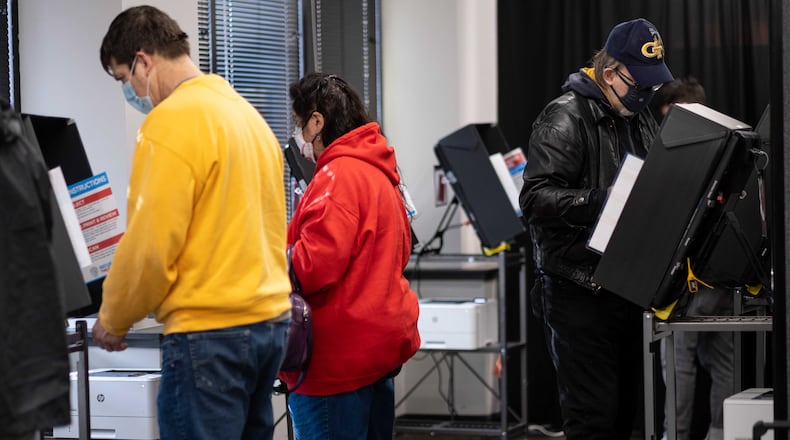A federal judge heard arguments Thursday opposing portions of Georgia’s new voting law, with plaintiffs asking the court to rule as some state voters head to the polls for special election runoffs later this month.
It’s unclear when U.S. District Judge J.P. Boulee will make a decision.
Eight lawsuits have been filed against the voting law Republican legislators passed earlier this year, and Thursday’s arguments were the first on the measure made before a federal judge.
Thursday’s case is different from the voting rights litigation filed last week by the U.S. Department of Justice that opposes voter ID requirements, ballot drop box limits, provisional ballot rejections and a ban on volunteers handing out food and water to voters waiting in line.
Brought by the Coalition for Good Governance, an election security organization, the lawsuit opposes a requirement that voters request absentee ballots at least 11 days before election day, leaving little time to apply to vote absentee in a quick runoff election.
The case also asks Boulee to intervene against parts of Georgia’s voting law addressing election observation that come with potential criminal penalties.
The new law prohibits observing voters casting ballots on brightly lit touchscreens, reporting problems to anyone but election officials, estimating absentee ballots cast, and photographing voting machines while voters are making their choices.
The Coalition for Good Governance argued that the limits placed on election observation intimidate voters and members of the press and violate the First Amendment.
“The state will acknowledge that transparency is essential for election integrity,” said Bruce Brown, an attorney for the coalition. “They say that, but what they mean by transparency is a fake transparency — it’s transparency theater, it’s integrity theater. It’s not real transparency. Because what these laws say is, ‘look, you can look, but you can’t tell.’ ”
But attorneys for Secretary of State Brad Raffensperger said the voting law’s requirements are reasonable and legal.
The 11-day deadline for requesting absentee ballots, which will occur Friday for this month’s runoffs, helps ensure that voters don’t apply for absentee ballots when it’s too late to return them in time, according to the state.
Attorneys for the state said at least eight states have similar or earlier deadlines. In previous elections, voters could request absentee ballots until four days before election day.
Bryan Tyson, an attorney representing the state, said the U.S. Postal Service warned states about delays in mail delivery as they headed into the election season in November.
“Given the background of the Postal Service delays and requests from county officials, the Legislature imposed a deadline because ballots that arrived that were requested at the very end of the election were not voted or returned,” Tyson said.
In addition, attorneys for the state say the law protects voters’ rights to a secret ballot by limiting observation and photography as they choose candidates.
All eight lawsuits opposing Georgia’s voting law, Senate Bill 202, have been assigned to Boulee, an appointee of then-President Donald Trump. He heard this case first because it’s seeking immediate court intervention for two ongoing runoffs.
Early voting is already underway before election day on July 13.
In Cobb County, Republican Devan Seabaugh faces Democrat Priscilla Smith in a contest to replace former state Rep. Bert Reeves, a Republican from Marietta who resigned to take a job at Georgia Tech.
In a South Georgia race, Republicans Leesa Hagan and Wally Sapp are seeking the seat of former state Rep. Greg Morris, a Republican from Vidalia who will serve on the State Transportation Board.
No other court hearings involving Georgia’s voting law have been scheduled so far. The cases could take years to resolve as they wind their way through the federal court system and potential appeals.
Contested parts of Georgia voting law
Observation limits: Anyone who intentionally observes a voter while casting a ballot in a way that would allow that person to see how a voter is voting could face felony charges.
Gag rule: Election monitors and observers can’t communicate any information they see from the processing and scanning of absentee ballots to anyone except election officials.
Estimation ban: Election monitors and observers aren’t allowed to estimate the number of absentee ballots cast.
Photography restrictions: Photography of voted ballots isn’t allowed.
Application deadline: Voters must request absentee ballots at least 11 days before election day.
Source: Senate Bill 202
Keep Reading
The Latest
Featured





